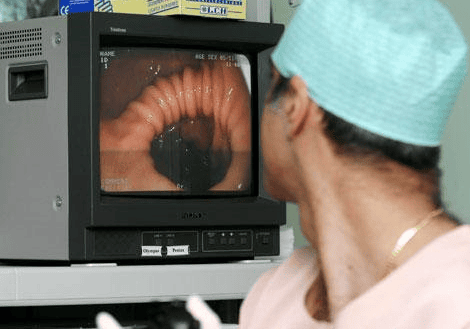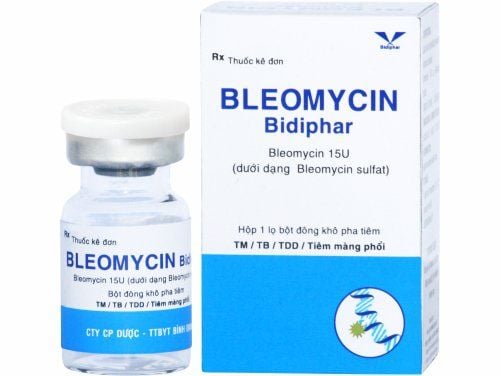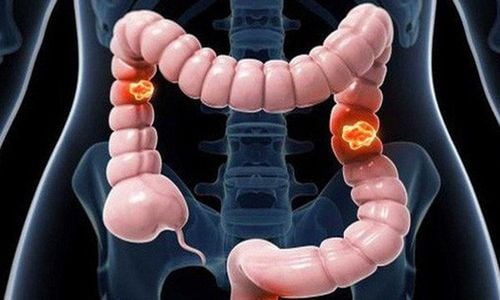This is an automatically translated article.
Colorectal cancer is a malignant and often fatal disease, but the risk is greatly reduced with regular screening and prompt removal of precancerous lesions. More evidence also suggests that eating habits can influence both the incidence and progression of colorectal cancer.
1. An overview of colorectal cancer
More than 95% of colorectal cancers are adenocarcinomas, which originate in the tissues of the rectum. Signs, symptoms, and complications of colorectal cancer depend on the location of the tumor. Common symptoms of colorectal cancer include: Abdominal pain, change in bowel habits, decreased stool volume and other physical symptoms such as weight loss, weakness, fatigue...
While the Tumors on the right side can cause bleeding, while tumors on the left side can lead to constipation, diarrhea, and hematoma. In addition, patients with left-sided tumors have a much higher risk of bowel obstruction, accompanied by nausea, vomiting, difficult defecation, bloating, abdominal distention or even anemia.
Approximately 15-20% of patients with colorectal cancer have metastases, most commonly metastases to lymph nodes in areas such as the liver, lungs, and peritoneum.

Táo bón là một trong những dấu hiệu ban đầu của bệnh ung thư đại trực tràng
1.1 Risk factors for colorectal cancer
Several factors are likely to increase the risk of colorectal cancer, including:
Age: The incidence of colorectal cancer increases with age, up to 90% of colorectal cancer cases occur. for patients over 50 years of age. Race: In the United States, blacks have a 20% higher incidence and mortality from colorectal cancer than whites. Family history: 25% of colorectal cancer patients have a family history of the disease. The risk will increase many times if more than one person in the family has had the disease Environment: The incidence of colorectal cancer is highest in developed countries. In addition, people who migrate from low-prevalence areas to high-prevalence areas also increase their risk of disease. relationship between diet and the development of colorectal cancer. Smoking: Smoking is a risk factor for both rectal polyps and colorectal cancer. Diseased smokers also have a higher risk of death Genetic syndromes: There are a number of genetic syndromes that increase the risk of colorectal cancer such as: Familial adenomatous polyposis and syndrome Lynch syndrome.

Hút thuốc lá làm tăng nguy cơ mắc bệnh ung thư đại trực tràng
Diabetes and insulin resistance: The risk of colorectal cancer in people with diabetes is nearly 40% higher than in the general population. This risk may be related to increased levels of insulin-like growth factor (IGF-1). Inflammatory bowel disease: Both ulcerative colitis and Crohn's disease lead to colorectal cancer with an almost five times higher risk than the general population. Overweight and obesity: People with a BMI > 40 have an approximately 45% higher risk of colorectal cancer than those with a normal BMI (18.5 to 24.9). People with mild or moderate obesity had a 10% and 35% higher risk of colorectal cancer, respectively.
1.2 Factors that have the ability to protect the body against colorectal cancer
In addition to some risk factors, there are a number of factors that are likely to protect the body against colorectal cancer, including:
Exercise, sports: Physical activity can reduce the risk of colorectal cancer. colorectal cancer. In a study of more than 120,000 female instructors, some of whom had never used hormone therapy, exercising for four or more hours a week halved the risk of colorectal cancer. compared to those who exercised or played sports for less than 30 minutes per week. Postmenopausal hormone therapy: Data from recently published studies suggest that hormone replacement therapy after menopause may reduce the risk of colorectal cancer. However, these methods are not recommended because they can increase the risk of some diseases, including other types of cancer. Aspirin and non-steroidal anti-inflammatory drugs (NSAIDs): Regular use of aspirin and other NSAIDs can reduce the risk of colorectal cancer by 20-40% in people at average risk. Colorectal cancer screening: This is one of the most effective methods in screening, detecting and treating cancer early.

Thuốc chống viêm không steroid (NSAIDs) có tác dụng chống lại ung thư đại trực tràng
2. Nutrition for people with colorectal cancer
Improper diet and overweight and obesity are the main causes of increasing the risk of colorectal cancer.
Certain foods increase the risk of colorectal cancer, especially red and processed meat. In contrast, a diet rich in vegetables and fruits can reduce the risk of colorectal cancer because it contains many plant-based factors that help protect the body against cancer in general and colorectal cancer. in particular. Here are some factors that reduce the risk of colorectal cancer that you can refer to:
Maintain a healthy weight: A meta-analysis of observational studies in more than 16,000 cases concluded that for every 5 kg of weight increase, the risk of colorectal cancer also increases by 4%. Compared with those of normal weight, both obese and underweight patients had a significantly higher risk of developing and dying from colorectal cancer. Follow a healthy diet: In a study of over 100,000 people including both men and women, those who ate less red meat had a significantly lower risk of disease than those who followed an omnivorous diet. . In addition, the Mediterranean diet is also capable of reducing the risk of colorectal cancer by 10%. Eat more fiber-rich foods: Studies on both total fiber intake as well as individual fiber-rich foods such as fruits, vegetables, whole grains, legumes, etc., show that They have the ability to protect the body against colorectal cancer. Eat foods rich in vitamin B: Green leafy vegetables, beans and whole grains are rich sources of vitamin B, an important factor in determining DNA methylation, affecting the maintenance of integrity. integrity and stability of genetic material. Vitamin B is involved in DNA methylation and tumor formation by reducing cell proliferation, oxidative stress, angiogenesis and other mechanisms.

Thực phẩm chứa nhiều chất xơ giúp hỗ trợ điều trị bệnh ung thư đại trực tràng
Use of foods rich in calcium and vitamin D: Systematic reviews and meta-analyses have demonstrated a significant effect of calcium and vitamin D supplementation in reducing the risk of colorectal cancer. People with high blood levels of vitamin D can reduce their risk of colorectal cancer by up to 30%. Coffee: In a health and diet study of 489,706 men and women, regular coffee consumption significantly reduced the risk of colorectal cancer compared with those who did not drink coffee. . Limit alcohol use: A 2015 review study found that drinking more than one drink per day was associated with a significantly increased risk of colorectal cancer. Colorectal cancer is a relatively common and serious disease. The risk of colorectal cancer can be reduced through a diet rich in plant-based foods and a healthy lifestyle. Even after diagnosis and treatment, changes in diet and lifestyle can be helpful, helping to reduce the risk of recurrence. How family members can also support the sick person by adopting healthy diets as well as practicing proper exercise habits.

Khách hàng có thể đến Bệnh viện Đa khoa Vinmec thực hiện tầm soát và phát hiện sớm ung thư đại trực tràng
Vinmec International General Hospital is implementing a Package of Screening and Early Detection of Colorectal Cancer, implemented by a team of experienced doctors and nurses in the field of colorectal cancer diagnosis and treatment. colonoscopy, with the support of a system of modern technological equipment, a full range of specialized means to diagnose the disease and stage it before treatment such as: Endoscopy, CT scan, PET-CT scan, MRI, Mammogram, histopathological diagnosis, gene-cell testing, ... help detect colon cancer early even when there are no symptoms.
Vinmec International General Hospital is a large hospital chain, the first general hospital in Vietnam to meet global medical standards. Currently, Vinmec is a leading medical facility in the field of colorectal cancer screening and detection. In addition, this is also one of the hospitals that not only ensures professional quality with a team of leading medical doctors, a system of modern technological equipment, but also stands out for its examination, consultation and treatment services. comprehensive, professional disease; civilized, polite, safe and sterile medical examination and treatment space.
Please dial HOTLINE for more information or register for an appointment HERE. Download MyVinmec app to make appointments faster and to manage your bookings easily.
SEE MORE
What is colorectal cancer screening? The need for colorectal cancer screening What should be done to detect colorectal cancer early?













